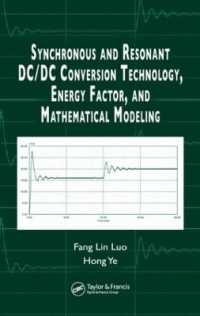- ホーム
- > 洋書
- > 英文書
- > Religion / Ethics
Full Description
A Critical Introduction to Religion in
the Americas argues
that we cannot understand religion in the Americas without understanding its
marginalized communities. Despite frequently voiced doubts among religious
studies scholars, it makes the case that theology, and particularly liberation
theology, is still useful, but it must be reframed to attend to the ways in
which religion is actually experienced on the ground. That is, a liberation
theology that assumes a need to work on behalf of the poor can seem out of
touch with a population experiencing huge Pentecostal and Charismatic growth,
where the focus is not on inequality or social action but on individual
relationships with the divine.
By
drawing on a combination of historical and ethnographic sources, this volume provides
a basic introduction to the study of religion and theology in the Latino/a,
Black, and Latin American contexts, and then shows how theology can be reframed
to better speak to the concerns of both religious studies and the real people
the theologians' work is meant to represent. Informed by
the dialogue partners explored throughout the text, this volume presents a
hemispheric approach to discussing lived religious movements. While not
dismissive of liberation theologies, this approach is critical of their past
and offers challenges to their future as well as suggestions for preventing
their untimely demise. It is clear that the liberation theologies of tomorrow
cannot look like the liberation theologies of today.
Contents
Acknowledgments IntroductionLatin American Liberation TheologyBlack Liberation Theology Latino/a Theology: To Liberate or Not to Liberate?African Diaspora ReligionConclusion NotesBibliography Index About the Author







